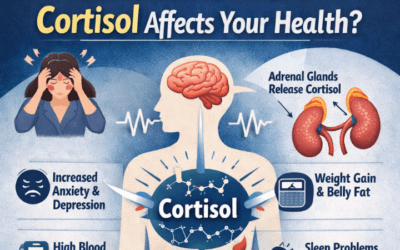As per the National Institute of Environmental Health Sciences, up to 50 million individuals in the United States are affected by autoimmune disease, ranking it as the third most prevalent disease category after cancer and heart disease.
Despite their prevalence, many people remain unaware of how autoimmune disorders develop and impact the body. In a healthy immune system, specialized cells and proteins defend against bacteria, viruses, and other harmful invaders. However, in autoimmune disease, this defense system malfunctions, mistakenly targeting the body’s own cells and tissues as if they were threats.
In this condition, finding the right autoimmune doctor is crucial for accurate diagnosis and personalized natural treatments for autoimmune disease. A medical doctor for autoimmune disorders can monitor disease progression, offer protocols for reversal, adjust medications (and ideally wean off of them), and coordinate care as needed. So, let’s learn about the factors to consider when choosing an autoimmune disease specialist for natural treatments:
Factors to Consider When Choosing an Autoimmune Specialist in Natural Treatments
When seeking doctors who specialize in autoimmune disorders, it’s crucial to conduct thorough research and consider various factors to ensure optimal care. Here are detailed insights into each key factor:
1. Expertise in Functional and Integrative Medicine
Finding a specialist trained in Functional or Integrative Medicine is crucial for autoimmune care. Unlike conventional approaches that primarily focus on symptom management, functional medicine emphasizes identifying the root causes of autoimmune disorders, which can include environmental triggers, nutritional deficiencies, genetic predispositions, and lifestyle factors. These specialists often use advanced testing methods to detect subtle imbalances in the immune system, hormonal function, or gut health, allowing for highly personalized treatment plans. By addressing underlying triggers rather than just suppressing symptoms, functional medicine practitioners aim to support long-term immune system balance and provide effective autoimmune diseases natural treatment options.
2. Experience with Autoimmune-Specific Diets
Your specialist should be knowledgeable about autoimmune-specific dietary protocols. Programs such as the Autoimmune Protocol (AIP) or Mediterranean-style diets have demonstrated anti-inflammatory effects and improvements in disease activity for many autoimmune conditions. A qualified doctor can guide you through eliminating foods that trigger immune responses, reintroducing foods safely, and ensuring adequate nutrient intake. They can also help tailor dietary strategies to your individual condition, lifestyle, and preferences, making adherence more realistic and effective.
3. Proficiency in Gut Health Restoration
The gut is often called the “second brain” of the immune system, and imbalances in the gut are closely linked to autoimmune disease development. An effective specialist should have expertise in restoring gut health through targeted interventions such as probiotics, prebiotics, anti-inflammatory nutrients, and, when appropriate, antimicrobial therapies to reduce pathogenic bacteria. By addressing leaky gut, dysbiosis, and chronic inflammation, these approaches aim to modulate the immune system, reduce autoimmune flares, and improve overall digestive and systemic health.
4. Utilization of Evidence-Based Natural Therapies
A reputable autoimmune specialist should integrate evidence-based natural treatments for autoimmune disease into their practice. This includes options such as elemental diets, immunoglobulin supplementation, and herbal interventions, which have been shown to modulate immune responses and reduce inflammation. Using therapies backed by research ensures that your treatment is both safe and effective, providing measurable improvements without relying solely on pharmaceutical interventions.
5. Ask for their Treatment Approach
Consider understanding their treatment philosophy and approach for natural autoimmune disease treatment. Besides that, inquire about their use of natural therapies that are based on scientific data, such as dietary modifications (e.g., anti-inflammatory diets like Mediterranean or autoimmune protocol diet), targeted supplementation (e.g., vitamin D, TUDCA, Butyrate), stress management techniques, exercise protocols, and alternative therapies like acupuncture or mind-body practices.
6. Integration of Nutraceutical Grade Supplements by Specialists
A knowledgeable autoimmune doctor understands the importance of being thorough with nutraceutical grade supplements and the potential adverse effects of traditional medications in long-term use. Nutraceuticals support organ function like liver detoxification and promote overall well-being without harsh side effects. Make sure your autoimmune disease doctor integrates nutraceuticals skillfully with lifestyle changes to promote overall healing without relying on pharmaceutical interventions.
7. Patient Reviews and Testimonials
Review patient testimonials, success stories, and online reviews to assess the specialist’s track record in helping patients manage autoimmune conditions naturally. The positive feedback regarding improvements in symptoms, quality of life, and overall satisfaction with care can be indicative of a skilled and compassionate practitioner.
8. Cost and Insurance Coverage
Some autoimmune disease doctors offer flexible payment options or package deals for comprehensive care plans. Understand the financial aspects of consultations, treatments, laboratory tests, and follow-up care, and learn about insurance coverage for natural therapies and any out-of-pocket expenses.
Red Flags When Selecting a Specialist
Pay close attention to the following red flags when finding the best doctor for autoimmune diseases:
1. Lack of Specialized Training:
Beware if the specialist lacks training in autoimmune disease like rheumatoid arthritis or lupus. And if they are promoting unproven or irrelevant therapies without scientific backing.
2. Dismissive Attitude Toward Symptoms:
Avoid specialists who dismiss symptoms without thorough evaluation or explanation and provide limited treatment options.
3. Ignoring Patient Input:
If they disregard the patient’s input and prioritizes numbers over patient symptoms and well-being.
4. Poor Collaboration with Other Professionals:
Lack of collaboration with other autoimmune specialists or healthcare professionals is a big no. Always seek doctors for autoimmune disorders who are open to collaborating with other healthcare professionals for comprehensive care.
5. Unclear Treatment Explanations:
Watch out for unclear explanations about treatment plans.
6. Fear-Based or Absolutist Language:
Steer clear if the specialists instill fear or make absolutist statements about treatment options.
7. Resistance to Tailored Care Plans:
If they are unwilling to consider a variety of options and do not adjust plans as needed.
Highlighting a Leader in Autoimmune Care: Dr. David Bilstrom
Dr. David Bilstrom is a renowned leader in autoimmune functional medicine, with 20 years of expertise in reversing and preventing autoimmune and chronic conditions. As the Medical Director of the International Autoimmune Institute at Bingham Memorial Hospital, he specializes in Functional Medicine, aiming to uncover the root causes of autoimmune disease without solely relying on immunosuppressant medications.Dr. Bilstrom adopts a revolutionary approach to autoimmune care and emphasizes that autoimmune disease can attack any part of the body. His focus lies in identifying “why” an individual has an autoimmune disease and addressing the underlying dysfunctions to enable the body’s natural healing process to function optimally. His treatment protocols are grounded in science and incorporate advanced testing, nutritional therapies, lifestyle changes, and personalized interventions customized to each patient’s unique biochemistry and health history. Dr. David Bilstrom’s mission is to change the way autoimmune disease is addressed globally and offer hope to those struggling with these conditions through natural alternative treatments for autoimmune disorders.
Conclusion
Seeing a doctor for autoimmune disorders gives you the specialized care and continuous support needed to reverse autoimmune diseases while improving your health. Trusting in their expertise can greatly improve your quality of life and long-term well-being.
Click here to schedule a consultation with Dr. David Bilstrom, an expert in autoimmune functional medicine. Rediscover hope and personalized care for your autoimmune condition today.
Frequently Asked Questions
While some patients experience significant improvement and symptom reduction through lifestyle modifications, diet, and targeted supplements, complete reversal depends on the type of autoimmune disease, severity, and individual factors. Natural treatments under the guidance of Dr. David Bilstrom focus on managing triggers, supporting organ function, and reducing inflammation, which can dramatically improve quality of life.
Results vary widely depending on the disease type, treatment approach, and adherence. Some patients notice improvements in energy, inflammation, or digestive health within weeks, while significant changes in autoimmune markers may take 3–6 months or longer. Patience and consistent follow-up with the specialist are key.
YYes. Autoimmune specialists focused on natural treatments like us often use advanced functional and integrative labs in addition to standard tests. These may include gut microbiome analysis, nutrient deficiencies, genetic markers, and inflammatory cytokine panels. Such tests help identify underlying triggers and guide personalized, non-pharmaceutical interventions.
Factors like chronic stress, poor sleep, toxin exposure, sedentary habits, and gut imbalances can worsen autoimmune symptoms. We address these with stress management techniques, detoxification strategies, movement routines, and sleep optimization, alongside nutrition and supplements, to support the body’s healing potential.
At our clinic, we track your progress using a combination of advanced lab tests, clinical markers, and personalized symptom monitoring. You’ll see tangible improvements such as reduced inflammation, increased energy, fewer autoimmune flares, and enhanced organ function. With regular follow-ups and expert adjustments, we ensure your natural treatment plan is fully tailored to your unique biochemistry, maximizing results and helping you regain control of your health.








